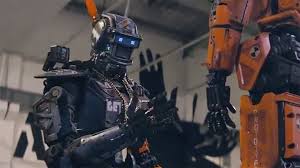Writer Alex Garland makes an impressive directing debut retooling Greek tragedy with silicon parts, writes Katherine Monk
[column size=”fourth” last=”no”]
Ex Machina
Four stars out of five
Starring: Domhnall Gleeson, Oscar Isaac, Alicia Vikander
Directed by: Alex Garland
Running time: 108 minutes
MPAA Rating: Restricted
[/column]
[column size=”three-fourths” last=”yes”]
By Katherine Monk
In 1738, a French engineer by the name of Jacques de Vaucanson presented a mechanical duck to the Academie Royale des Sciences de Paris. The careful arrangement of cogs and gears gave the creature lifelike properties: It could flap its wings, quack, eat and even – thanks to a long tube deployed from its base – poop.
There’s no record of what de Vaucanson’s peers thought of his creation. The pages of Academie history are sadly blank. But we can well imagine at least one delicate “Pourquoi?” falling from the lips of the learned.
There’s no good reason under the sun to make a fake duck capable of defecating, yet someone spent countless hours and used every single technological tool at their disposal in order to make one.
So if you’re looking for the big why in Alex Garland’s mesmerizing Ex Machina, remember the duck, and accept the human urge to animate the inanimate as a basic assumption.
We have a deeply seeded need to create. It gives us meaning, but creative genius can also raise ego to dangerous altitudes, and cause some creators to believe they’re on par with The Creator.
Such is the case in Ex Machina, Garland’s impressive directorial debut that follows a series of successful novels and adapted screenplays, including 28 Days Later, Sunshine and The Beach.
In this stark yarn, Oscar Isaac plays Nathan, a tech billionaire and programming guru who lives far away from the madding crowd in an isolated bunker in the mountains. Nathan has created something that needs to be tested, and in the opening scenes of the film, we watch him recruit his tester.
Caleb (Domhnall Gleeson) is a code writer for Nathan’s company, and though the mechanics of it are only explained a few scenes later, he scored the proverbial golden ticket that won him admission to Nathan’s magical secret factory.
Garland creates tension from the minute the two men meet face to face: He holds back on Nathan’s reveal, then stalks Caleb with the camera. The power dynamic is completely off-balance. More importantly, by the time we actually see Nathan’s face, we already find him menacing – and we don’t even know what he’s created yet.
Garland keeps the tease going on that one, too: He uses our curiosity as the hook then yanks us through a sea of cleverly scripted metaphysical banter about the nature of consciousness. For a time, it almost feels like eavesdropping on a TED Talk as Nathan and Caleb enjoy meaningful exchanges designed to showcase their towering intelligence.
But even in the rare shots featuring natural light, something always feels a little creepy, and it’s a credit to Garland’s direction, as well as the two performers, that the tension feels emotionally genuine: These two guys don’t like each other. It’s an ego thing, which makes the next act all the more dramatic as we’re introduced to Ava (Alicia Vikander).
A robot equipped with artificial intelligence and a pretty human face, Ava would make the perfect wedding cake companion to Peter Weller’s Robocop. A cyborg whose cinematic pedigree can be traced back to Fritz Lang’s memorable false Maria in Metropolis, as well as every Fembot ever created for the S ix Million Dollar Man, Maria presents a double threat as a robot archetype because she’s not just artificial, she’s been given feminine gender.
At this point, we should make a note of our human hero’s name: Caleb is referred to as “the spy” in the Bible, but he’s also one of the spies who urged the Hebrews to put their trust in God and Moses.
Caleb evolved into a believer, and so does his screen counterpart. Seduced by Ava’s attentiveness and glistening circuits, the young programmer entertains fantasies that only Joaquin Phoenix could relate to.
And yet, we go down the rabbit hole with him on his quest to bridge the gap between ourselves, and the glorified and gussied-up reflection of ourselves that advanced technology affords.
It’s an insane equation, and perhaps that’s what makes Ex Machina a little more haunting than your average Transformers exercise: Garland pushes the crazy button on both sides of the hero-villain balance sheet.
We expect Nathan to be a mad scientist with Dr. Frankenstein tendencies, but in watching our Everyman fall prey to the same narcissistic impulse in his desire to be the conquering hero, Garland shows us how our desire for perfection only brings out our worst.
It’s classic Greek tragedy with silicon parts and an Alex Garden edge, which already guarantees great style and an exhaustive understanding of science-fiction genre. Coupled with one of the sharpest sword fights in recent screen history, and Ex Machina feels like the best bit of fakery that ever fell from heaven.
kmoexpress@gmail.com
For more Katherine Monk movie reviews, visit ex-press.com
-30-
[/column]

